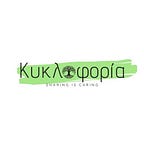What if?
I’m Bella, probably the idealist among us who’s head can be find in the clouds from time to time, and this is the story of how I came to be part of Κυκλοφορία.
“Oh, wow, next week’s the day. I’m leaving for Athens. It would have taken me 36 hours by train and the flight was cheaper. This is so wrong. Why is it so easy and cheap for us to pollute the environment? And why does it seem so complicated to live sustainably?”
An awareness of environmental issues, climate change and animal welfare, sustainability, was something my parents instilled in me. But what was for them a conscious and free decision — in a time when vegetarianism was a mental confusion and global warming was hardly considered an issue, when nuclear power was the enemy and the echo of the Vietnam War was still noticeable — is obligatory for our generation. We must question our lifestyles, find ways to minimize our consumption, manifest a sustainable mindset. We have to start thinking about the local and global consistency of our individual behavior. The big industries, political decision makers and power holders must take responsibility. We seem to be at the point where a radical change in our way of life cannot heal the symptoms produced by capitalism and colonialism, but it might alleviate them. We have to look for treatment options, therapies for the disease “capitalism”, which has been spreading for years, slowly but surely, like a deadly virus, through increasing globalization, all over the world.
So I am sitting in my room in Berlin, packing my belongings for Athens. A city that in my mind is one of the central historical and political centres of Europe, located in a country that has gone through many ups and downs.
My plane landed at about eleven o’clock in the evening. So I just went straight to my apartment and got a good night’s sleep. The next morning I decided to buy coffee and some breakfast for my roommate and me, when the baker didn’t want to use the coffee cups I had brought with me and instead gave me two disposable cups.
“Hmm, maybe reusable to-go cups aren’t really a thing around here.”
Meanwhile, in Berlin, you get discounts if you bring your own mug with you, or have to pay more for plastic or paper cups.
A little later that Saturday, I went to a huge open-air market near where I live. I was thrilled and happy about all the fresh food. Over the years, I have come to appreciate and love regional, sometimes uneven, imperfect fruits and vegetables. In the meantime, there is absolutely nothing more satisfying to me than knowing that the food did not travel too far, did not require complicated, expensive and unsustainable logistics companies or support large industries.
It was striking how incredibly many plastic bags were in circulation in this market. Red, yellow and white bags everywhere. The salespeople reacted astonished or almost angry when I asked to have the vegetables or fruits weighed and sold with no plastic bag. I made the same experience in the supermarket. Thus I began to take my own plastic bags with me.
When I left the market I wandered through the small, narrow streets of Neos Kosmos and stumbled over overflowing garbage cans with old furniture or clothes next to them.
A little later I started to work for a social organization that, among other things, distributes clothing donations to people in need and prepares food for them.
“All the food, the clothes that might have no value for me could be valuable for other people, just exactly what they are looking for.”
Plastic bags are banned in Germany, there are apps for food sharing and second hand fashion. Goods, cars, refrigerators are borrowed, given away or sold, so that we at least compensate for some of the over-consumption. These ideas of collective consumption and goods are spreading increasingly, becoming more popular. Not least because of the guilty conscience that torments quite a few people. Knowing that they live in abundance — at the expense of others and especially the environment.
A few days later I find myself in a seminar dealing with social issues and innovations as well as corporate responsibility. We are supposed to form groups and choose one of the SDGs. It quickly dawns on me: although we are different, come from various cities and life realities, we have one thing in common: our shared interest in sustainability. We all made similar observations in Athens, try to pursue a sustainable lifestyle and see environmental degradation as one of the greatest and most dangerous sins of our time.
This is my story. My way to Kykloforia.
